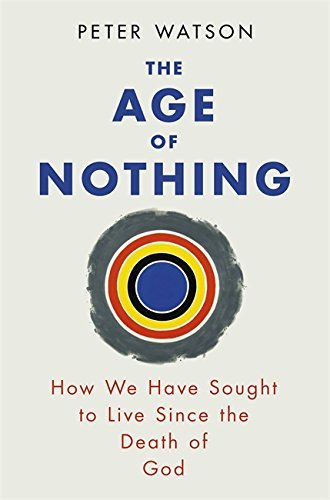
The closing months of 2008 saw the world's nations united in financial uncertainty. Amid endless reports of collapsing stock markets, failed banks, fiscal fraud and snowballing unemployment, THE AGE OF NOTHING offers a compelling insight into the demise of capitalism and the beginning of a new era. Peter Watson's scintillating thesis argues that the unprecedented credit crunch of 2008 was the result of a fundamental change in the fabric of society - one that became truly visible only as it reached its culmination. In a commanding narrative, Watson provides a historical perspective on the shift in our attitudes towards capitalism, while exploring the philosophical roots that underpin it. Of central importance in Watson's theory is Nietzsche's warning regarding mankind's responsibility for 'the death of God' - and the consequences thereof. Nietzsche's views on the frailty of human values in a world bereft of religious faith were echoed by writers including Tolstoy, Marx and Kandinsky - and his chilling message went on to resonate with thinkers throughout the 20th century. When Max Weber called the modern world 'disenchanted', and argued that society must choose to create a new value system based on knowledge or else surrender and embrace a religious faith, he was the latest in a long line of intellectuals attempting to address the problem Nietzsche had laid bare. With the arrival of THE AGE OF NOTHING, the line continues. The work fills a crucial gap in our intellectual history and serves as a comprehensive study of society's current predicament - as well as a timely answer to the question of what to do next.
Author

Peter Watson was educated at the universities of Durham, London and Rome, and was awarded scholarships in Italy and the United States. After a stint as Deputy Editor of New Society magazine, he was for four years part of the Sunday Times ‘Insight’ team of investigative journalists. He wrote the daily Diary column of the London Times before becoming that paper’s New York correspondent. He returned to London to write a column about the art world for the Observer and then at The Sunday Times. He has published three exposes in the world of art and antiquities and from 1997 to 2007 was a Research Associate at the McDonald Institute for Archaeological Research at the University of Cambridge. He has published twelve books of non-fiction and seven novels, some under the pen name of Mackenzie Ford. He lives in London where his interests include theatre, opera and fishing. Awards, Etc. Psychology Prize Durham University, 1961 Italian Government Music Scholarship Rome University, 1965 United States Government Bursary “for future world leaders” To study the psychiatric profession and its links to the administration of justice Books of the Year Psychology Today Magazine, 1978, for War on the Mind Daily Mail, 1990, for Wisdom and Strength Independent on Sunday, for A Terrible Beauty, 2000 Times Literary Supplement, for Ideas, 2005 Time Magazine, for The Medici Conspiracy, 2006 Queen’s Pardon Copy from Patrick Meehan after I had written a series of articles which brought about his release from prison after he had been wrongly convicted of murder, 1976. Gold Dagger – Crime Writers’ Association of Great Britain For The Caravaggio Conspiracy, 1983 Beacon Award – SAFE Award – Saving Antiquities for Everyone For The Medici Conspiracy, 2006 US Library Association The Great Divide. Emmy Nomination ‘The Caravaggio Conspiracy, 1984. Best sellers The Caravaggio Conspiracy Crusade Landscape of Lies Sotheby’s: The Inside Story Nureyev Lectures Peter Watson has lectured at the following venues: Universities Cambridge Berkeley London UCLA Birmingham Georgia Georgia Chicago Birmingham Santiago de Chile York Madrid Harvard Tufts Military Bases Fort Bragg Private Institutions in Cleveland Berlin Chicago Belfast Los Angeles New York Washington Boston Palm Beach Other venues Smithsonian Institution National Museum, Copenhagen Royal Society of Arts Rugby School Royal Library, Copenhagen Festivals Edinburgh Oxford Dartington York